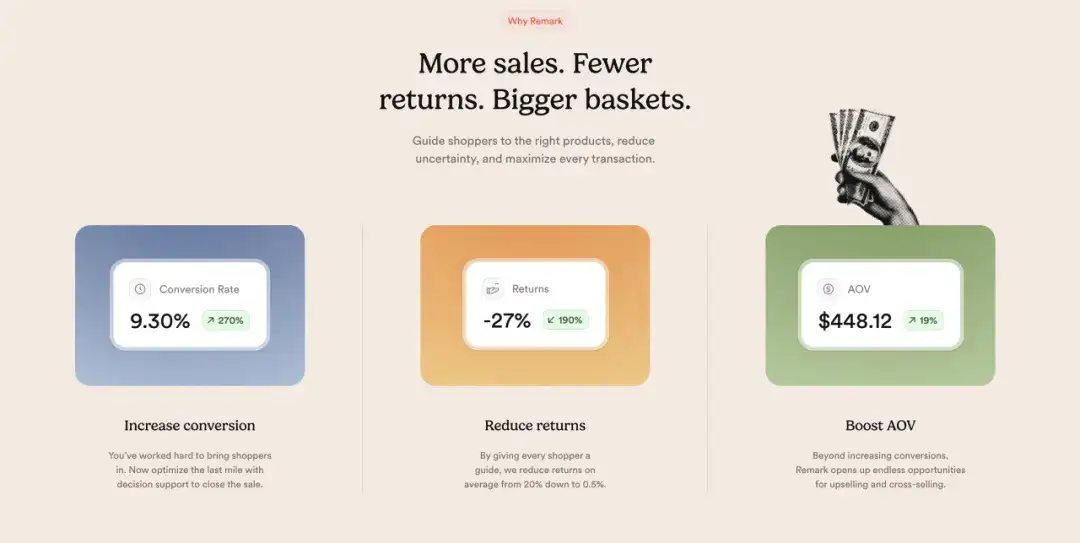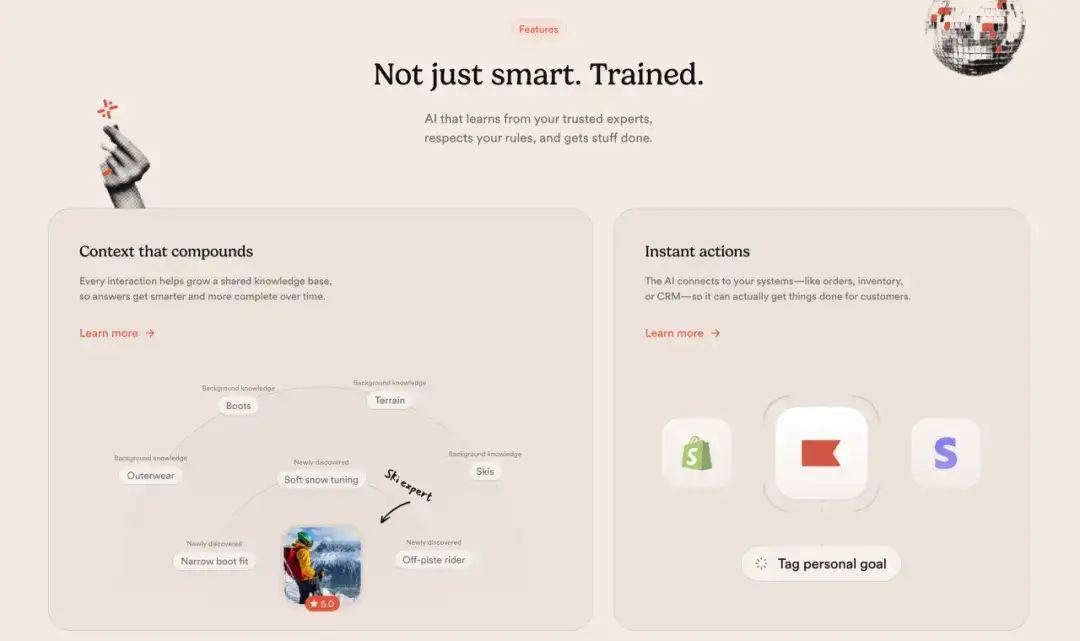Remark Raises $16M: E-commerce's Scale AI Is Born
.webp)
Eric Walker · 15, July 2025
The 30% vs 1.5% Mystery: Why Physical Stores Dominate
Ever wondered why physical stores achieve 30-35% conversion rates while e-commerce struggles with 1.5%? When I investigated Remark—which just raised $16 million in Series A funding—I discovered the answer: online shopping lacks what makes physical stores effective—real product experts who understand your needs.
Think about visiting an Apple Store or Sephora. There's always someone who gets what you're looking for and guides you perfectly. Online? You're drowning in product pages and reviews. No wonder we end up on Reddit seeking advice before purchasing.
Remark CEO Theo Satloff and co-founders Carl-Philip Majgaard and Ian Patterson—collaborating since college—realized e-commerce hasn't fundamentally changed since 1998. Despite countless improvements, we're stuck with generic storefronts and checkout pages. Their vision? Give every shopper a personalized store experience.

Revolutionary Approach: Real Experts Training AI
The Human-First Philosophy
While everyone chases "AI replaces everything," Remark chose differently. They have thousands of real experts chat with customers, then use those conversations to train AI models. This preserves human warmth while gaining AI's scalability.
On Remark's platform, you might chat with Olympic athletes about running gear, licensed aestheticians about skincare, or experienced parents about baby products. These aren't AI fabrications—they're based on 60,000+ verified experts' real knowledge.
How the System Works
When experts are offline, their AI personas continue serving customers with their unique voice and insights. The results are stunning: 28% conversion rates versus the industry's 1.5%. Some users even engage in 10-minute mobile consultations—unprecedented in traditional e-commerce.
The operational model is clever. Remark dynamically generates questions to guide purchases. Shopping for cookware? It asks about your stove type. Click any question, and you're matched with an expert or their AI persona. Experts earn per chat and commissions when their AI drives sales. Top performers reportedly make $60,000-70,000 annually working just 15-20 hours weekly.

The Network Effect Advantage
Every conversation makes the system smarter. As TechCrunch reports, this creates a powerful network effect—Remark's biggest competitive advantage. The more conversations, the better AI personas become at handling complex questions and providing personalized advice.
Free Gemini and Claude available on GlobalGPT, an all-in-one AI platform.
Why Now? The Perfect Storm for Human-AI Collaboration
Kamran Ali from lead investor Inspired Capital offers key insight: "As AI floods the internet with generated content, actual human insights become increasingly precious." This paradox—human value increasing in the AI age—explains Remark's appeal.
Since ChatGPT's launch, AI-generated content surged 8,000%. Consumers face "AI fatigue" from generic chatbots. They realize value isn't in AI technology itself, but the human wisdom behind it. Remark captures this by injecting real expertise into scalable AI systems.
Rising customer acquisition costs create another catalyst. With expensive ads and declining conversion rates, brands need better traffic efficiency. According to PYMNTS, Remark delivers 10% average net revenue increases and saved brands $3.2 million in customer service costs.
The technology timing is perfect too. Today's language models handle complex conversations but lack genuine expertise. Remark fills this gap, combining AI's processing power with human knowledge. After their 2024 funding, revenue grew 4x with 100% customer retention—validation of their approach.
Business Model Evolution and Market Strategy
Remark shifted from revenue sharing to SaaS subscriptions based on traffic, signaling confidence in long-term value. They focus on mid-market brands in categories requiring expertise—fashion, beauty, health, outdoor gear. Smart positioning, since these purchases need guidance versus commodities driven by price.
Their partner brands—Darn Tough Vermont, PEARL iZUMi, DECKED, Embr Labs—all require deep product knowledge, validating Remark's proposition. The expert network expanded from 50,000 to 60,000, enabling coverage of more categories while maintaining quality through certification partnerships.
Redefining E-commerce's Future
Remark isn't just improving shopping—they're redefining infrastructure. Traditional e-commerce assumes more information helps users decide. Reality shows users need guidance, not data overload.
Consider this: e-commerce represents only 20% of global retail. Why? In-store conversion rates exceed online by 20x because of knowledgeable staff creating "aha moments." Remark brings this online through dynamic personalization—the system rewrites content based on conversations, creating unique stores for each user.
Looking ahead, Remark plans recommendation blogs from expert conversations and personalized follow-ups. This complete loop from consultation to content to CRM could transform brand-consumer interactions. They're becoming "e-commerce's Scale AI"—transforming customer conversations into proprietary training data like Scale transformed human labeling into AI infrastructure.
Challenges and Opportunities Ahead
Despite promise, challenges exist. Ensuring 60,000 experts maintain quality is difficult. Bad experiences could damage reputation. The 5-8 second response window might pressure service quality. Long-term, advancing AI might eliminate the need for human input—Remark must evolve to maintain advantage.
Yet the opportunity is massive. Any purchase requiring expertise—home improvement, auto parts, investments, education—could benefit from this model. But rapid expansion risks diluting their core value.
Remark proves technology's value isn't replacing humans but amplifying their expertise. In our digital world, maintaining human touch matters. As Theo Satloff says, "AI should enhance the human experience, not replace it."
Whether Remark maintains its lead while scaling quality remains the key question. If successful, they won't just build a better tool—they'll redefine how human expertise and AI collaborate in the digital age. With strong metrics, proven model, and perfect timing, they're positioned to transform how we shop online forever.
Relevant Resources
